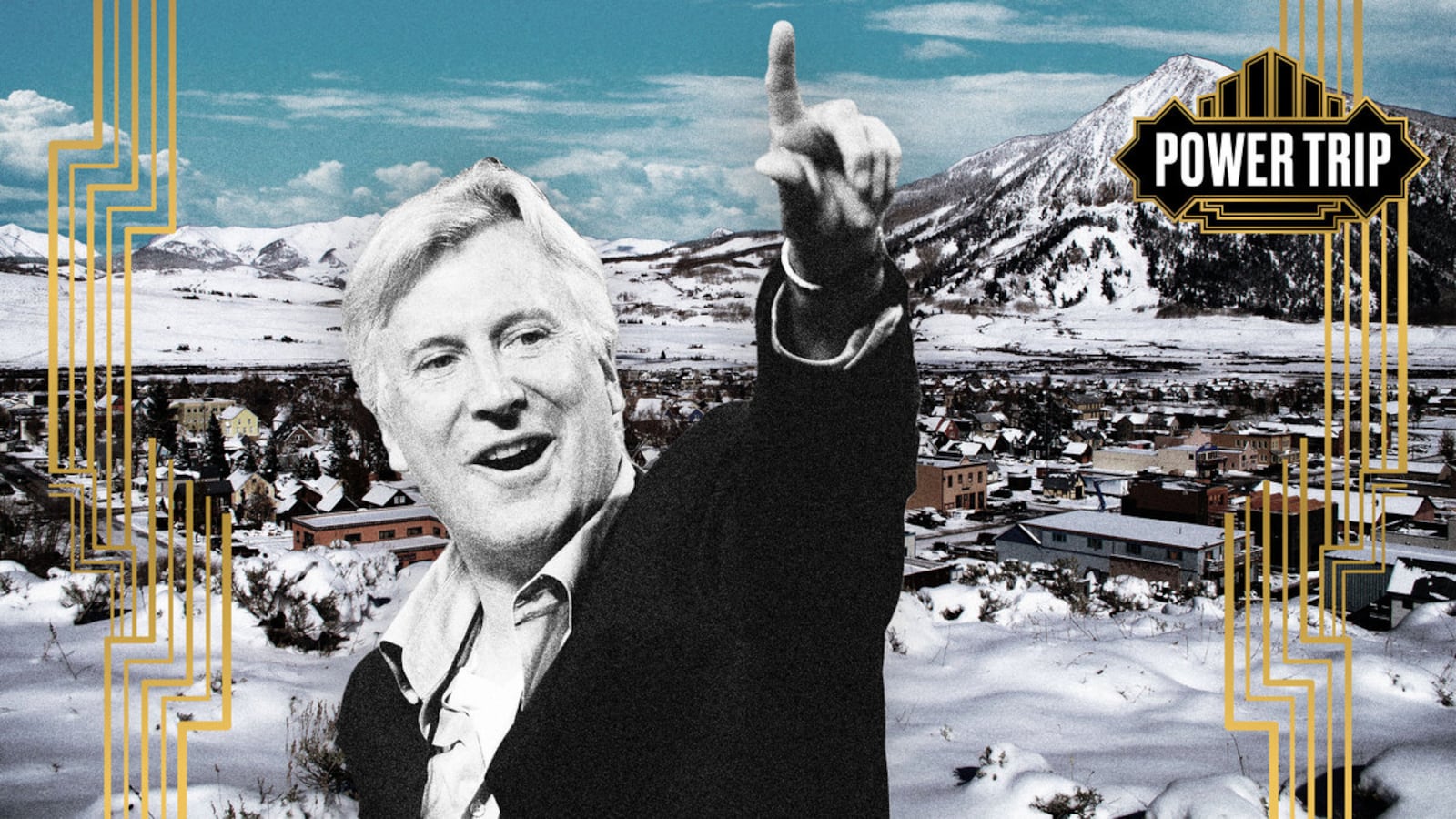The mountain hamlet of Crested Butte, Colorado, covers less than a square mile and, at an elevation of nearly 9,000 feet, it is taller than it is wide. So when a Chicago-based billionaire began quietly buying up its historic buildings, residents took note.
“I was alarmed that someone would come in and buy up so much commercial property in the community,” former Gunnison County Commissioner Jim Starr told The Daily Beast. “That had not happened before. We've got few owners who own two or three different commercial properties. But the scale of this was larger than what we have seen previously.”
The billionaire in question is investment banker Mark Walter. An intensely media-averse figure, the CEO of Guggenheim Partners has accumulated a net worth of approximately $5.3 billion, according to Forbes, with little fanfare. His most overtly public move came in 2012, when Walter joined forces with Magic Johnson and several other entertainment figures to buy the Los Angeles Dodgers for a record-breaking $2.15 billion.
But Walter’s activity in Crested Butte has drawn lots of local attention among its population of about 4,700. This year alone, Walter purchased six commercial properties, including several historic buildings downtown and a family resort called the Almont, which sits at the intersection of the East and Taylor rivers. Walter closed the deals under limited liability companies registered to his work address in Chicago
“He’s been very—I wouldn’t say ‘secretive’—but certainly not forthcoming with what he’s going to be doing with the buildings,” Crested Butte Mayor Jim Schmidt told The Daily Beast. Realtor Eric Roemer echoed the uneasy feeling: “Nobody really knows what his game plan is.”
“I have no idea what Mr. Walter is planning to do,” writer and Gunnison County resident George Sibley said, “and I don’t think anyone else does either—possibly including Mr. Walter.”
Among his new investments, Walter acquired a building called the Forest Queen for $1.55 million, a commercial property containing a spa and tattoo shop for $1.85 million, a restaurant called the Wooden Nickel for $1.85 million, a health club for $1.7 million, an undeveloped lot for $5.5 million, and the resort for $6.3 million. All together, the new purchases totaled more than $20 million.
A spokesperson for Walter declined to comment. This is something of a pattern; in an opinion piece for the Crested Butte News, local writer Mark Reaman described contacting the CEO’s realtor to see if he would discuss future plans. “After she finished laughing,” Reaman wrote, “she basically indicated I probably had a better chance of getting Donald Trump to chat with me about Almont.”
Even Roemer, who owned the Wooden Nickel before Walter bought it, said he hadn’t been able to get any information about the plans. “The only thing that we’ve been told by his representatives is that, at least with the Wooden Nickel, he’s interested in continuing the operation as it has been,” Roemer said. “Whether it’s been modified no one knows at this time. But he's planning on opening that business towards the end of May.”
The purchases left Schmidt somewhat confused, as commercial property in ski towns can make for tricky economics. Usually, he said, commercial buildings sell at about three times the price of local residences. But in high-end ski regions where homes get so expensive, the math can make it harder for smaller businesses to turn a profit. “You’d have to charge way too much for hamburgers,” he said. “That’s the challenge.”
A lingering question for residents is what Walter will do with the undeveloped lot on the north edge of town, heading towards the ski slopes. The sprawling property, known locally as the “Sixth Street Station,” was approved for a massive hotel and residential building in 2017. According to Schmidt, it would be the largest hotel in Crested Butte. But it remains unclear if Walter plans to proceed with the construction project..
Walter has had a quiet presence in the Crested Butte area for the past decade. He and his wife have owned a home in the neighboring town of Mt. Crested Butte since 2009, and in 2011, he bought a commercial complex known as the Grubstake Building for $766,700. The Grubstake housed a tea house, a cafe, an art gallery, and a fishing shop, which Walter has kept active.
For a time, the CEO went through a local permitting process to convert the building into a music and dance venue. According to Starr and Schmidt, he later backed off the plans over the town’s required one-time payment for street parking.
“He did not like the parking-in-lieu charges which we apply to all businesses,” Schmidt said. “Frankly, I was a little surprised that he thought the amount was excessive, considering what he pays a third string outfielder for the Dodgers.”
For a time several years ago, the town had an advertising slogan: "Crested Butte—what Aspen used to be, and Vail never was." The joke was that Crested Butte was “the last great Colorado ski town,” one that hadn’t yet been bought up by even wealthier outsiders looking for a seasonal stay. But some residents are concerned that Walter’s investments may change that.
“One of the concerns, of course, is that when people have more of the commercial properties like that, the rents tend to go up, which makes it harder for the business owners,” Starr said. “And we've got a real severe affordable housing shortage here, so this eventually could exacerbate that problem as well.”
But Sibley pointed out that Walter followed a long line of wealthy investors coming to Colorado. “There would not even be Colorado towns were it not for outside money basically,” he said, citing some Kansas bankers who’d invested in the ski slopes in Crested Butte and a Texas refining company that operated a nearby mine.
“Before that of course, it was a coal mining town and it was essentially a company town for Colorado Fuel and Iron, which is based in Pueblo,” Sibley said. “So it’s always been pretty much a wholly owned subsidiary of outsiders.”
But Walter’s investment may herald a wave of a new strain of outsiders. “I’ve heard folks say, ‘We've reached the point where the billionaires are pushing out the millionaires,’” Starr said, “which a lot of us who’ve lived here for quite a while had hoped would never happen.”
An earlier version of this article said that Walter did not respond to comment. He declined to comment.


